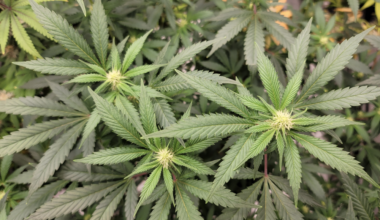“The industry is growing, but our involvement is not.”
Abe Givins sunk into a leather armchair at the Cola Private Lounge in St. Louis on Saturday afternoon, where his company hosted a panel of doctors speaking about medical marijuana.
Givins is co-owner of Village, which advertises itself as the only vertically-integrated medical marijuana company in Missouri that’s 100 percent minority owned—meaning they have licenses to grow, manufacture and sell marijuana products.
A key part of the company’s mission, Givins said, is fighting for social equity in the cannabis industry, particularly in light of how the war on drugs has ravaged minority communities.
“A lot of people that I know have been incarcerated for cannabis offenses that were non violent,” said Givins, whose company is part of the Viola Brands franchise, one of largest Black-owned cannabis companies in the country. “So why not fight to get into the space and make it better for the people that are incarcerated?”
More than 2,000 applications were submitted for medical marijuana licenses in 2019, but fewer than 400 were ultimately awarded. And while the state doesn’t track the race of those who got a license, Givins and others in the burgeoning industry say few went to Black-owned businesses.
With the state potentially on the verge of another vote this fall on whether to legalize recreational marijuana, many in the Black community fear being shut out yet again.
“The industry is growing, but our involvement is not,” said Brennan England, state director of Minorities for Medical Marijuana, an advocacy organization for cannabis legalization.
At the heart of the Black community’s concern are the license caps implemented by state regulators.
The state decided early on to only issue the minimum licenses allowed under Missouri’s constitution: 192 dispensary, 86 manufacturing and 60 cultivation. The number of licenses issued since setting those caps is slightly higher for each category.
The recreational marijuana proposal with the best chance of ending up before voters this fall, called Legal Missouri 2022, would allow the state to continue capping licenses while giving current medical marijuana license holders dibs on recreational licenses—a move critics argue would only reinforce the inequity built into the current system.
“[Legal Missouri] creates monopolies,” said Democratic state Rep. Ashley Bland-Manlove, president of the Missouri Legislative Black Caucus. “People who have the desire and the skill set and maybe the bare minimum qualifying capital are boxed out.”
Legal Missouri supporters say the system’s racial inequities would be addressed through the 144 “micro licenses,” where applicants must be a resident from a ZIP code with high marijuana incarceration rates or meet other such requirements.
Currently, one of the biggest struggles for many smaller medical marijuana companies is obtaining capital. Marijuana is still illegal on a federal level, so bank loans are not an option.
And it’s often more difficult to build that capital for Black business owners in general, said Adolphus Pruitt, president of the NAACP chapter in St. Louis city.
“Those micro licenses are what’s going to be Black folks’ entry into the marketplace, because they don’t have the capital,” said Pruitt, who supports Legal Missouri.
And the license cap is also an important piece of the equation, said John Payne, campaign manager for Legal Missouri.
“If you want to have equity for the people that win the micro licenses, then you do want to have some level of limits there,” Payne said.
But to critics, the Legal Missouri plan only offers minority businesses a small piece of the pie.
“Micro business licenses are limited to one per applicant,” unlike regular licenses, said Christina Thompson with ShowMe Canna-Freedom, a group advocating for marijuana policy reform in Missouri. “This blatant inequality is not what Missouri stands for, and it sets a terrifying precedent for our Constitution.”
Inequities in the application process
After Missouri voters signed off on medical marijuana in 2018, it was up to the Department of Health and Senior Services (DHSS) to build the entire program from the ground up.
They set about doing that under strict constitutional deadlines over the next year.
As DHSS began setting up the program’s rules, as well as building the bidding process for licenses, state lawmakers, the Missouri Legislative Black Caucus, business leaders and the Missouri Medical Cannabis Trade Association urged regulators to ensure there was racial diversity in the medical marijuana marketplace.
Democratic state Sens. Steve Roberts and Karla May of St. Louis say they spoke directly with DHSS leadership in early 2019 asking for the application process to include the Minority Business Enterprise (MBE) program, which would give a set amount of bonus points in a competitive bidding process to businesses that are at least 51 percent owned and controlled by one or more minority persons.
The trade association also encouraged DHSS to focus on diversity in ownership as well.
“For most large State of Missouri contracts, everything from IT services to road construction, some consideration, including points, are awarded for MBE/WBE participation,” according to an April 23, 2019 letter from Andrew Mullins, executive director of MoCannTrade, to the medical marijuana advisory committee. “Medical marijuana licensing should not be excluded from these same considerations.”
But in the end, instead of utilizing the MBE program, the state included a question in the application that asked businesses to provide a diversity plan, which included diversity in staffing and ownership.
It was a half measure, Roberts said.
“They had no interest in supporting minority businesses or helping them get these licenses,” Roberts said. “And there were plenty of viable businesses that applied and could have been very successful in our state.”
A DHSS spokeswoman said the state’s marijuana law, “limited the factors DHSS could consider in reviewing medical marijuana applications. DHSS considered the input of all stakeholders, including the Missouri Legislative Black Caucus, and incorporated that input where the law allowed.”
Regarding tracking minority ownership, she said the medical marijuana program does not require personal information of any kind from licensees or patients that is not directly related to a Department responsibility.
Roberts and others said the diversity questions were “too subjective,” and many applicants allege that the scores were inconsistent.
In what’s become a familiar refrain since state awarded licenses in January 2020, jilted companies complained that they received different scores for identical answers—in many cases lowering their overall points enough to cost them a license.
That includes scores on the diversity portion of the application for minority-owned businesses.
In August 2019, Jaws Ventures Inc., previously a minority-owned business, applied for seven licenses – one for cultivation, one for manufacturing and five for dispensaries. DHSS denied all seven. The group appealed, arguing that the scoring inconsistencies on the diversity questions contributed to them losing out.
In one of the group’s dispensary applications, the company missed a license by only 0.1 points.
On the question, “How will the business train employees on diversity and cultural awareness?” they received a “7.” But on another of their applications with the same answer, they received a “10,” which would have added 1.2 points and put them above the cutoff line for scores.
The company argued that DHSS’s own scoring guide states that where applicants provided identical responses to a question on multiple applications, “the score must be the same.”
A representative of Jaws Ventures Inc. declined comment on their appeals because some were still ongoing. However, according to DHSS’ lists of license owners, the group was eventually awarded one dispensary license and one manufacturing license.
The state has been ordered on at least three occasions by the administrative hearing commission to issue licenses to companies it had previously denied based on issues with inconsistent scoring.
Givins believes minorities who missed out on Missouri’s medical marijuana licenses, or were delayed in receiving them, could still get in the game.
Recreational marijuana will likely be more sustainable because there’s more potential revenue than the medical market, said Givins, who started the company with his cousin former NBA player Larry Hughes.
“Whether you get a patient in there or not, you still have bills to pay,” Givins said. “So once recreational comes, of course, you will have way more customer flow, because a lot of people don’t like dealing with the medical card aspect.”
‘Cannabis Freedom Act’
On Tuesday, a Missouri House committee heard testimony on a proposal sponsored by Republican Rep. Ron Hicks of Defiance that would legalize recreational marijuana in Missouri without capping business licenses.
Dozens of people who testified in favor of Hicks’ “Cannabis Freedom Act” alleged that Legal Missouri would create a monopoly, causing further inflated marijuana market prices.
Under the Legal Missouri proposal, for the first 18 months the state would only award “comprehensive licenses” to sell, manufacture and cultivate recreational marijuana to the entities that currently have the medical marijuana business licenses.
Hicks said that path could have a particularly harmful impact on minority business owners.
“How many licenses is that that we give away, right off the bat?” Hicks told the House Public Safety Committee Tuesday morning. “And if we put a cap on it, then what’s left? How do the minority individuals in this state open their business in this industry?”
Hicks’ bill currently has 20 co-sponsors, including Republican Rep. Shamed Dogan, who filed similar legislation and Bland-Manlove. It includes a provision for the expungement of nonviolent marijuana offenses from criminal records, through a court petition process.
John Pennington, founder and CEO of St. Louis-based Proper Cannabis, testified against Hicks’ bill Tuesday. He’s invested $23 million in his medical marijuana business, and he said he’s seeing a substantial surplus in production, like other Missouri growers.
“So open this up to an unlimited licensed state, the black market will expand,” said Pennington, who also a partner and owner of the commercial real estate company Savoy Properties. “Standards will be reduced. More people will be using cannabis and will get in the wrong hands.”
Like several others who testified in opposition, Pennington pointed to Oklahoma where law enforcement officials say the low barriers for entry and the loose regulatory environment has led to a huge increase in the number of illegal operators – who sell across state lines.
An attorney with MoCANN echoed these same issues and the need for license caps. But Rep. Shane Roden, a Cedar Hill Republican and the committee’s chairman, pushed back.
“So what I got from that was—the state of Missouri is actually a monopoly,” Roden said. “We’re the ones collecting a $50,000 licensing fee with a non refundable, so I’d say that hampers some individuals from being able to legally start their business, especially if they can’t get a loan.”
The Independent’s Jason Hancock contributed to this story.
This story was first published by Missouri Independent.
Medical Disclaimer:
The information provided in these blog posts is intended for general informational and educational purposes only. It is not a substitute for professional medical advice, diagnosis, or treatment. Always seek the advice of your physician or other qualified healthcare provider with any questions you may have regarding a medical condition. The use of any information provided in these blog posts is solely at your own risk. The authors and the website do not recommend or endorse any specific products, treatments, or procedures mentioned. Reliance on any information in these blog posts is solely at your own discretion.







